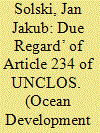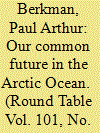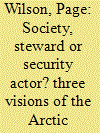| Srl | Item |
| 1 |
ID:
188220


|
|
|
|
|
| Summary/Abstract |
Article 234 of UNCLOS is in many ways exceptional, but it is not unique in the sense that it grants to the coastal state “complete” legislative power. Arguably, “complete” coastal state jurisdiction exists in the territorial sea for the purposes enumerated in Article 21(1), allowing coastal states to adopt ship reporting systems, pilotage, and other routing measures unilaterally. The analysis of state practice reveals that states often decide to engage the International Maritime Organization (IMO) in different ways, even when such a course of action is not mandatory. This article advocates for meaningful deliberation as both a suitable method of meeting Article 234’s due regard standard, and a practice that can be expected from a steward.
|
|
|
|
|
|
|
|
|
|
|
|
|
|
|
|
| 2 |
ID:
112473


|
|
|
|
|
| Publication |
2012.
|
| Summary/Abstract |
Environmental state-change in the Arctic Ocean is introducing risks of political, economic and cultural instability. Interests are awakening to take advantage of new energy, shipping, fishing and tourism opportunities associated with the diminishing sea-ice. With urgency-building on the common arctic issues of sustainable development and environmental protection-environmental security offers an holistic context to address the risks and opportunities within law of the sea, as the international legal framework to preserve peace and stability in the Arctic Ocean.
|
|
|
|
|
|
|
|
|
|
|
|
|
|
|
|
| 3 |
ID:
143341


|
|
|
|
|
| Summary/Abstract |
While a long-term decrease in overall Arctic sea ice extent has been recorded by the US National Snow and Ice Data Center (2014) since the late 1970s, the unprecedented levels of ice melting and thinning experienced in the region in 2007, and subsequently in 2012, have brought the Arctic once again to the forefront of international affairs. Much popular and academic attention has focused on whether the Arctic is likely to remain a zone of cooperation, or descend into conflict. However, less attention has been paid to examining the evolution and role of fora in the region, such as the Arctic Council. In this paper, it is argued that three visions are presently shaping ways of thinking about the Council: the first envisages the Council as a society for Arctic states; the second sees the Council as a steward for the Arctic; and the third imagines the Council as a fully-fledged security actor. The extent to which each vision is manifested in the practices of the Council and its members is also examined. Finally, the paper considers what the ongoing tensions within and among these three ways of conceptualising the Council means for its future prospects, and for Arctic politics more generally.
|
|
|
|
|
|
|
|
|
|
|
|
|
|
|
|